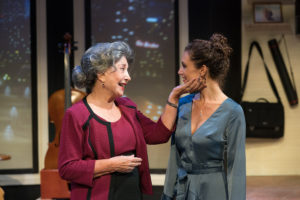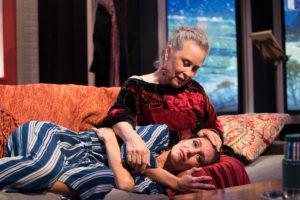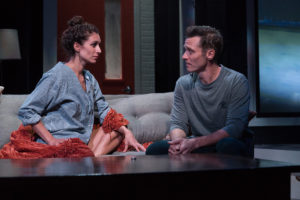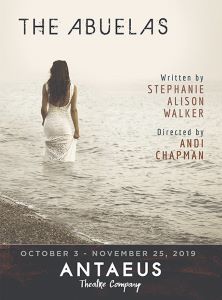
THE DIRTY WAR COMES HOME
Stephanie Alison Walker’s The Abuelas at Antaeus Theatre is the story of a woman discovering that she is a child of the “Disappeared,” the approximately 30,000 people killed through state-sponsored terrorism during Argentina’s 1976-1983 Dirty War, when opposition to the military junta-led government was ruthlessly quashed.
Two generations of women, mothers and grandmothers, have spent decades trying to uncover the truth of those who were murdered and to find the living: los desaparecidos con vida, the babies kidnapped from the disappeared. The grandmothers’ search for their stolen grandchildren has both restored and uprooted the lives of hundreds of adults who grew up unaware of their violent beginnings; that they were not the biological offspring of the people who raised them, but of women who were murdered after giving birth.
Argentine actress Luisina Quarleri stars as Gabriela, a successful Argentine concert cellist living in Chicago who discovers the unwelcome truth of her origins. Seamus Dever plays her architect husband Marty. The couple has an infant child and a history of marital problems. Denise Blasor is Soledad, the woman Gabriela has 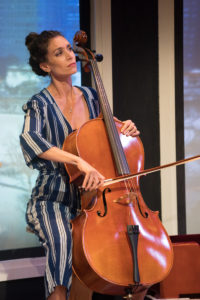 known as her mother; Irene Di Bari plays Carolina, Gabriela’s biological grandmother of whom she has been unaware; and David DeSantos plays César, the forensic anthropologist who brings Gabriela and Carolina together at a birthday celebration for Soledad.
known as her mother; Irene Di Bari plays Carolina, Gabriela’s biological grandmother of whom she has been unaware; and David DeSantos plays César, the forensic anthropologist who brings Gabriela and Carolina together at a birthday celebration for Soledad.
The cast is talented and believable. Ms. Quarleri is thoroughly engrossing as a woman juggling motherhood and a high-pressure career in the arts, but she is undercut somewhat by two decisions the playwright makes; the first, to introduce the fact that Gabriela had been approached two years earlier with a request for her DNA but refused; the second, to require the actress to awkwardly pantomime playing the cello as well as play a few notes live. I don’t for a minute believe that Quarleri would have ignored the possibility that she was a child of the disappeared — out of basic curiosity if nothing else. And the cello playing falls flat, taking us out of the reality the script attempts to construct.
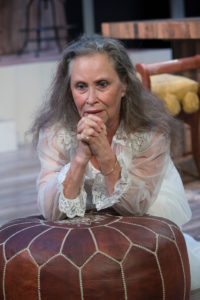 The subject matter is fascinating, yet my attention wandered. If you have read one word about the show, you know the minute Carolina arrives that Gabriela is going to turn out to be her granddaughter, but it takes an hour to get us there. Characters spend large amounts of time telling and retelling their origin stories and explaining their feelings. Still, they do not emerge as fully dimensional despite the excellent performances.
The subject matter is fascinating, yet my attention wandered. If you have read one word about the show, you know the minute Carolina arrives that Gabriela is going to turn out to be her granddaughter, but it takes an hour to get us there. Characters spend large amounts of time telling and retelling their origin stories and explaining their feelings. Still, they do not emerge as fully dimensional despite the excellent performances.
Who is Carolina? What makes her spend decades searching for someone she has never actually met? Did her friends and family in Argentina support her? Or did they tire of the brittle certainty that such a quest would likely engender? Her life is presented as if it is defined solely by this one action. If so, why would she fly to Chicago with no plan of how she will approach Gabriela? What choices did she make along the way and what have those choices cost her?
César’s origin as a child of the disappeared is also presented as a straightforward story of truth vanquishing evil and lies. Mr. DeSantos is persuasive, and he exudes a soulful sense of emotional struggle, but the text gives him little to run with. What has this cost him?
If we are to believe Soledad’s account of how she and her husband became Gabriela’s parents (and there is no alternative story given) then she is not wrong when she points out that if they hadn’t taken the baby, someone else most certainly would have or the child might even have been killed. Where she is on far shakier ground is in not coming clean once the regime had been toppled or in the years since. How did she live with that decision? What did it cost her? We see that it destroys her relationship with Gabriela in the present, but how has it affected them in the years that have come before?
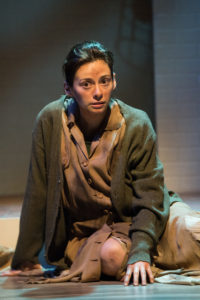 And there is another fascinating area of internal drama that Ms. Walker leaves unexplored: What have the two years been like since Gabriela was first approached? Ignoring the possibility would have taken an enormous amount of denial and resolve. What has that burden been like for her?
And there is another fascinating area of internal drama that Ms. Walker leaves unexplored: What have the two years been like since Gabriela was first approached? Ignoring the possibility would have taken an enormous amount of denial and resolve. What has that burden been like for her?
Gabriela’s acceptance of Carolina and rejection of Soledad unfolds as a fait accompli. The writing attempts to acknowledge the emotional turmoil of the situation without truly exploring it. Director Andi Chapman seems intent on avoiding the whole thing collapsing into soap opera, but in doing so, the drama itself feels inert. We are left applauding the reunion of granddaughter and grandmother with little sense of what it will mean for either of them. It’s like the whole play has been backstory for a far more complex tale of what will come next.
photos by Jenny Graham
The Abuelas
Antaeus Theatre Company
Gindler Performing Arts Center
110 East Broadway in Glendale
Fri and Sat at 8; Sun at 2; Mon at 8
ends on November 25, 2019
for tickets, call 818.506.1983 or visit Antaeus

